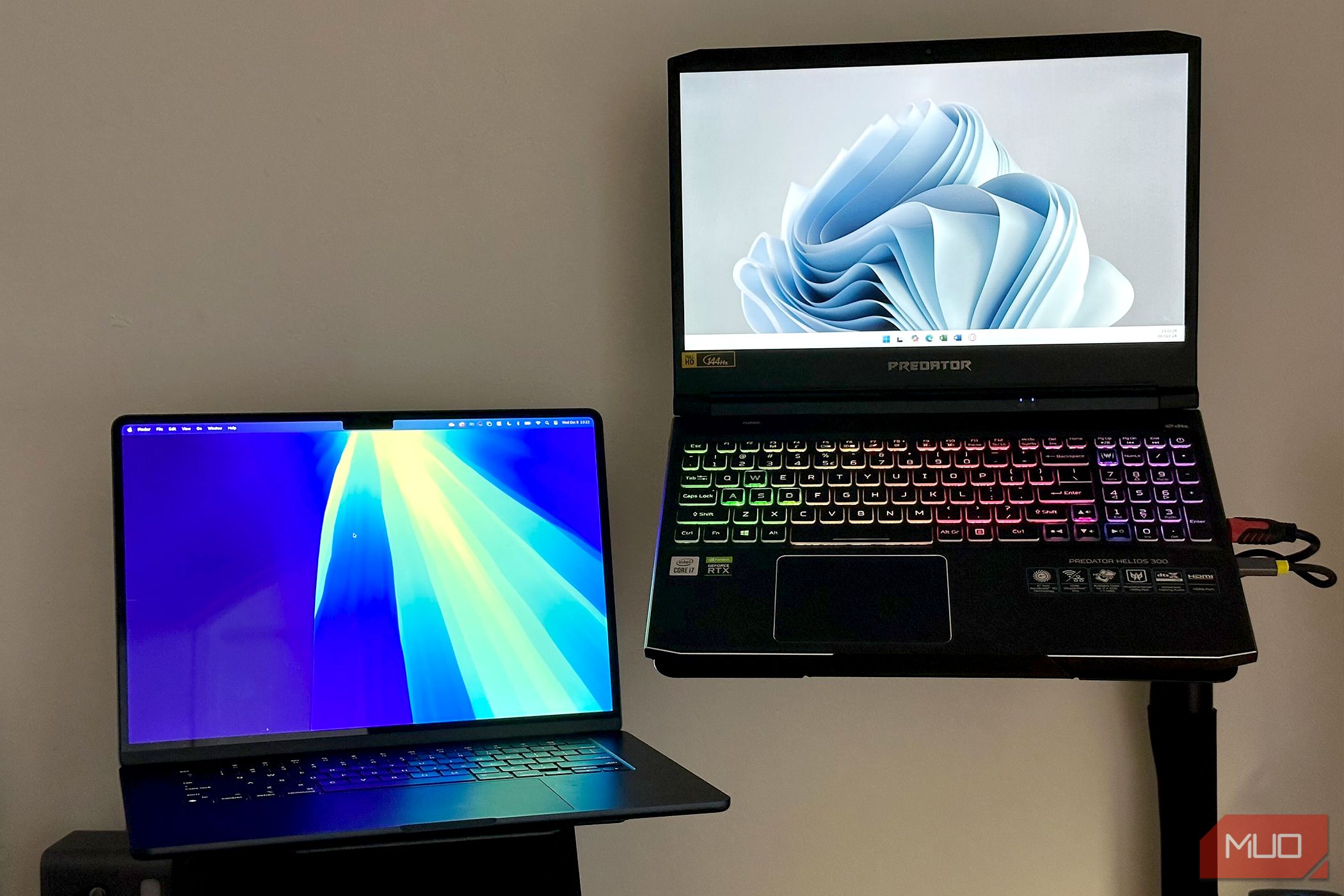As a student, you might think getting a MacBook is essential for your learning, but that’s not always the case. Instead of getting a MacBook, you should buy a Windows laptop for a few good reasons.
6
They Have More Ports
One advantage of Windows laptops is the available ports. Apple’s MacBook Air models have embraced an all-USB-C design, which may look sleek, but often means you’ll need extra dongles and adapters for basic tasks like plugging in a USB flash drive, connecting to an external monitor, or reading an SD card. If you’re a student, that can be inconvenient and costly.
Windows laptops, on the other hand, offer far more variety. Many models include a mix of USB-A, USB-C, HDMI, Ethernet, headphone jacks, and SD card readers. This means you can connect directly to projectors, printers, external storage, or cameras without extra accessories.
For those in creative fields like photography, design, or video editing, built-in card readers are a huge time-saver since you can pop a microSD card in and out without needing an adapter.
5
Cheaper Repairs and Maintenance
A Windows laptop is also the best option for college because of the lower cost of repair and maintenance. Sure, you can also repair a MacBook through Apple or authorized service providers, but that can be expensive. Even seemingly minor fixes like replacing a battery can cost several hundred dollars due to Apple’s proprietary parts and tightly integrated designs.
Typically, an out-of-warranty battery replacement for a MacBook costs between $159 and $249. In contrast, replacing a Windows laptop’s battery is relatively inexpensive. Even better, most models are designed with repairability in mind, allowing you to purchase a replacement battery and install it yourself, making it cheaper. For example, Framework laptops are modular, making them perfect for easy repair, maintenance, and upgrading, even if you’ve never touched a screwdriver before.
While you can try DIY, it’s not the safest battery replacement option for a MacBook. For other parts, Apple’s anti-repair practices, such as parts pairing, will result in limited functionality, including disabled True Tone and Touch ID. For a MacBook, you’re better off taking it to Apple or one of its authorized service providers, but be prepared to pay top dollar for repair.
As a student, you might not have $159 sitting around to splurge on a repair. Even if you decide to pay for the company’s AppleCare One all-in-one subscription plan, $19.99/month is difficult to justify as a student.
4
Far Easier Upgrades
Another reason why you shouldn’t buy Apple hardware as a student is the ability to upgrade. Upgradability is one of the most practical advantages that many Windows laptops have over MacBooks. When buying a laptop for college, upgradability is key, since you might not have the money to get enough storage or RAM. Once you decide on a specific Windows laptop, prioritize the processor, then select the minimum storage and RAM available that you can afford.
So when you need more RAM or storage down the road, you can add it for a fraction of the cost instead of buying another laptop. With Windows laptops, you can start with a more affordable configuration as a freshman and upgrade over time as coursework becomes more demanding.
While more and more Windows laptops are getting soldered memory like current MacBooks, there are still plenty of options that offer swappable memory.
3
Versatile Hardware Choices
One of the biggest strengths of Windows laptops over MacBooks is the incredible variety of hardware options. Apple’s MacBook lineup is limited to a few models, but Windows laptops come in every form you can imagine—lightweight ultrabooks, 2-in-1 convertibles, gaming machines, budget-friendly notebooks, and professional workstations. This means you can pick a laptop that’s not only within your budget but also tailored to your exact needs.
Need a touchscreen for quick note-taking or sketching diagrams in class? There’s a laptop for that. Want a large display for multitasking or a smaller one for ultra-portability? You’ll find dozens of choices.
You can also customize the device further when purchasing by selecting display resolutions, port selections, and even specialized features like touchscreen support or dedicated graphics cards—none of which Apple offers in its current MacBook lineup. The versatile hardware choices make Windows the best option for college because they let you find a laptop that perfectly matches your needs, budget, and workload.
2
Broader Software Compatibility
You may not think about it when joining college, but the truth is, if you’re pursuing a field in engineering, you’ll likely need a Windows laptop and not a MacBook because of broader software compatibility. While macOS is polished and reliable, it’s limited when it comes to certain academic, professional, and hobbyist tools because some of the software used is exclusively available on Windows.
For example, certain engineering programs rely on Windows-only applications like SolidWorks. Running these on a Mac often requires setting up a virtual machine or using Boot Camp (on Intel Macs), which consumes extra resources and complicates the workflow.
If you’re purchasing a MacBook in 2025 and beyond, you’ll likely choose a model running Apple’s M-series chips, which are ARM-based. So even if you use Parallels Desktop to run Windows 11 on your Mac, some of these apps won’t run because they don’t support the Windows ARM version yet.
Another gotcha is that if you want to play games in your free time, you’re better off getting a Windows laptop since the vast majority of games are designed for Windows. Additionally, Windows is better suited for running legacy software programs because it maintains strong backward compatibility, which is important as some learning software could be created for older hardware.
In contrast, macOS regularly drops support for older software architectures. For example, macOS Catalina removed all support for 32-bit apps, making many older programs impossible to run without workarounds.
1
They’re Much More Cost-Effective
The first reason you might consider skipping a MacBook for college is the cost. While Apple’s laptops are sleek and powerful, they come with a premium price tag. Even the cheapest models, such as a MacBook Air, cost around $1,000 or more.
Take the current M4 MacBook Air as an example. It costs $999 for the base model with 16GB RAM and 256GB of storage. Even with education savings, you’re only saving $100 off the regular price, which isn’t much. And when you consider Apple’s high markup on memory and storage, you can easily spend $1500.
For a student, that’s money better spent on textbooks, software, or living expenses. By opting for a Windows laptop, you get better value for money. The Acer Aspire 3 A315-24PT-R0UX laptop, for instance, goes for about $500 and features a 15.6-inch touchscreen display, 16GB of RAM, 512GB of storage, and Wi-Fi 6. The ASUS Vivobook S 14 is another excellent choice for less than $700 with Intel’s Ultra 5-226V processor, a 14-inch OLED FHD+ display, 16GB of faster LPDDR5X RAM, 512GB storage, and Wi-Fi 7.
And it’s not just these two. Many of the Windows alternatives offer fast processors for student-related tasks, solid battery life, and lightweight designs perfect for carrying between classes. Plus, if your laptop gets lost, damaged, or stolen, replacing it may not be as expensive as buying a new MacBook.
Plus, you’re more likely to get better discounts on Windows laptops than MacBooks. It’s not uncommon to find a laptop with the same MSRP as a $1400 MacBook selling for $400 or $500 less.
A MacBook might seem like the best option for college, but before you splurge on Apple’s premium hardware, know that it comes with its downsides. Picking a Windows laptop offers clear advantages over MacBooks in cost, versatility, and practicality. They include a wider range of hardware options, broader software compatibility, easier upgrades, and cheaper repairs.
Put together, Windows laptops adapt more easily to your changing needs and budget as a student, unlike MacBooks.
















